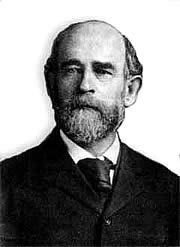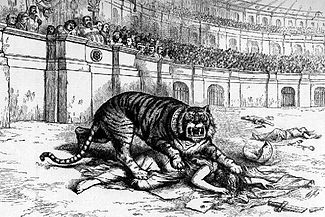| Henry George: “The Problem” | |||
 |
For reformer
Henry George, "The Problem" was the enormous progress made in technology
and industry in the 19th century that had not only not alleviated all
human suffering, it had made conditions significantly worse for much of the
working poor population, or at the very least had widened the gap between rich
and poor. One of his targets was the New York City political machine, Tammany Hall. |
 Tammany Hall Cartoon--the Tammany Tiger is crushing the people. --Thomas Nast |
|
… Go into one of the new communities where Anglo-Saxon vigor is just beginning the race of progress; where the machinery of production and exchange is yet rude and inefficient; where the increment of wealth is not yet great enough to enable any class to live in ease and luxury; where the best house is but a cabin of logs or a cloth and paper shanty, and the richest man is forced to daily work--and though you will find an absence of wealth and all its concomitants, you will find no beggars. There is no luxury, but there is no destitution. No one makes an easy living, nor a very good living; but every one can make a living, and no one able and willing to work is oppressed by the fear of want. But just as such a community realizes the conditions which all civilized communities are striving for, and advances in the scale of material progress-just as closer settlement and a more intimate connection with the rest of the world, and greater utilization of labor-saving machinery, make possible greater economies in production and exchange, and wealth in consequence increases, not merely in the aggregate, but in proportion to population--so does poverty take a darker aspect. Some get an infinitely better and easier living, but others find it hard to get a living at all. The "tramp" comes with the locomotive, and almshouses and prisons are as surely the marks of "material progress" as are costly dwellings, rich warehouses, and magnificent churches. Upon streets lighted with gas and patrolled by uniformed policemen, beggars wait for the passer-by, and in the shadow of college, and library, and museum, are gathering the more hideous Huns and fiercer Vandals of whom Macaulay prophesied. This fact--the great fact that poverty and all its concomitants show themselves in communities just as they develop into the conditions toward which material progress tends--proves that the social difficulties existing wherever a certain stage of progress has been reached, do not arise from local circumstances, but are, in some way or another, engendered by progress itself. And, unpleasant as it may be to admit it, it is at last becoming evident that the enormous increase in productive power which has marked the present century and is still going on with accelerating ratio, has no tendency to extirpate poverty or to lighten the burdens of those compelled to toil. It simply widens the gulf between Dives and Lazarus, and makes the struggle for existence more intense. The march of invention has clothed mankind with powers of which a century ago the boldest imagination could not have dreamed. But in factories where labor-saving machinery has reached its most wonderful development, little children are at work; wherever the new forces are anything like fully utilized, large classes are maintained by charity or live on the verge of recourse to it; amid the greatest accumulations of wealth, men die of starvation, and puny infants suckle dry breasts; while everywhere the greed of gain, the worship of wealth, shows the force of the fear of want. The promised land flies before us like the mirage. The fruits of the tree of knowledge turn as we grasp them to apples of Sodom that crumble at the touch. It is true that wealth has been greatly increased, and that the average of comfort, leisure, and refinement has been raised; but these gains are not general. In them the lowest class do not share.* I do not mean that the condition of the lowest class has nowhere nor in anything been improved; but that there is nowhere any improvement which can be credited to increased productive power. I mean that the tendency of what we call material progress is in nowise to improve the condition of the lowest class in the essentials of healthy, happy human life. Nay, more, that it is still further to depress the condition of the lowest class. The new forces, elevating in their nature though they be, do not act upon the social fabric from underneath, as was for a long time hoped and believed, but strike it at a point intermediate between top and bottom. It is as though an immense wedge were being forced, not underneath society, but through society. Those who are above the point of separation are elevated, but those who are below are crushed down.
This association of poverty with progress is the great enigma of our times. It is the central fact from which spring industrial, social, and political difficulties that perplex the world, and with which statesmanship and philanthropy and education grapple in vain. From it come the clouds that overhang the future of the most progressive and self-reliant nations. It is the riddle which the Sphinx of Fate puts to our civilization, and which not to answer is to be destroyed. So long as all the increased wealth which modern progress brings goes but to build up great fortunes, to increase luxury and make sharper the contrast between the House of Have and the House of Want, progress is not real and cannot be permanent. The reaction must come. The tower leans from its foundations, and every new story but hastens the final catastrophe. To educate men who must be condemned to poverty, is but to make them restive; to base on a state of most glaring social inequality political institutions under which men are theoretically equal, is to stand a pyramid on its apex. All-important as this question is, pressing itself from every quarter painfully upon attention, it has not yet received a solution which accounts for all the facts and points to any clear and simple remedy. This is shown by the widely varying attempts to account for the prevailing depression. They exhibit not merely a divergence between vulgar notions and scientific theories, but also show that the concurrence which should exist between those who avow the same general theories breaks up upon practical questions into an anarchy of opinion. Upon high economic authority we have been told that the prevailing depression is due to over-consumption; upon equally high authority, that it is due to over-production; while the wastes of war, the extension of railroads, the attempts of workmen to keep up wages, the demonetization of silver, the issues of paper money, the increase of labor-saving machinery, the opening of shorter avenues to trade, etc., are separately pointed out as the cause, by writers of reputation. And while professors thus disagree, the ideas that there is a necessary conflict between capital and labor, that machinery is an evil, that competition must be restrained and interest abolished, that wealth may be created by the issue of money, that it is the duty of government to furnish capital or to furnish work, are rapidly making way among the great body of the people, who keenly feel a hurt and are sharply conscious of a wrong. Such ideas, which bring great masses of men, the repositories of ultimate political power, under the leadership of charlatans and demagogues, are fraught with danger; but they cannot be successfully combated until political economy shall give some answer to the great question which shall be consistent with all her teachings, and which shall commend itself to the perceptions of the great masses of men. It must be within the province of political economy to give such an answer. For political economy is not a set of dogmas. It is the explanation of a certain set of facts. It is the science which, in the sequence of certain phenomena, seeks to trace mutual relations and to identify cause and effect, just as the physical sciences seek to do in other sets of phenomena. It lays its foundations upon firm ground. The premises from which it makes its deductions are truths which have the highest sanction; axioms which we all recognize; upon which we safely base the reasoning and actions of everyday life, and which may be reduced to the metaphysical expression of the physical law that motion seeks the line of least resistance-viz., that men seek to gratify their desires with the least exertion. Proceeding from a basis thus assured, its processes, which consist simply in identification and separation, have the same certainty. In this sense it is as exact a science as geometry, which, from similar truths relative to space, obtains its conclusions by similar means, and its conclusions when valid should be as self-apparent. And although in the domain of political economy we cannot test our theories by artificially produced combinations or conditions, as may be done in some of the other sciences, yet we can apply tests no less conclusive, by comparing societies in which different conditions exist, or by, in imagination, separating, combining, adding or eliminating forces or factors of known direction. I propose in the following pages to attempt to solve by the methods of political economy the great problem I have outlined. I propose to seek the law which associates poverty with progress, and increases want with advancing wealth; and I believe that in the explanation of this paradox we shall find the explanation of those recurring seasons of industrial and commercial paralysis which, viewed independently of their relations to more general phenomena, seem so inexplicable. Properly commenced and carefully pursued, such an investigation must yield a conclusion that will stand every test, and as truth, will correlate with all other truth. For in the sequence of phenomena there is no accident. Every effect has a cause, and every fact implies a preceding fact. That political economy, as at present taught, does not explain the persistence of poverty amid advancing wealth in a manner which accords with the deep-seated perceptions of men; that the unquestionable truths which it does teach are unrelated and disjointed; that it has failed to make the progress in popular thought that truth, even when unpleasant, must make; that, on the contrary, after a century of cultivation, during which it has engrossed the attention of some of the most subtle and powerful intellects, it should be spurned by the statesman, scouted by the masses, and relegated in the opinion of many educated and thinking men to the rank of a pseudo-science in which nothing is fixed or can be fixed--must, it seems to me, be due not to any inability of the science when properly pursued, but to some false step in its premises, or overlooked factor in its estimates. And as such mistakes are generally concealed by the respect paid to authority, I propose in this inquiry to take nothing for granted, but to bring even accepted theories to the test of first principles, and should they not stand the test, freshly to interrogate facts in the endeavor to discover their law. I propose to beg
no question, to shrink from no conclusion, but to follow truth wherever it may
lead. Upon us is the responsibility of seeking the law, for in the very heart
of our civilization to-day women faint and little children moan. But what that
law may prove to be is not our affair. If the conclusions that we reach run
counter to our prejudices, let us not flinch; if they challenge institutions
that have long been deemed wise and natural, let us not turn back. |
|||
|
|||